23 july 2018
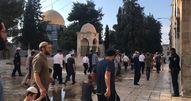
Dozens of Israeli settlers stormed on Monday morning Jerusalem’s al-Aqsa Mosque—the third holiest site in Islam—via the Maghareba Gate.
Israeli police cordoned the plazas of al-Aqsa Mosque at 07:30 a.m. to secure the break-in.
Public relations chief at the Islamic Awqaf Department Firas al-Dabes said 95 Israeli settlers, escorted by policemen, showed up at the site in groups and carried out sacrilegious tours. video
Fanatic Israeli rabbis delivered presentations on the history of the alleged temple mount.
Israeli police reportedly cracked down on Muslim worshipers at the main entrances to the site.
Dozens of Palestinians from Occupied Jerusalem and territories occupied in 1948 flocked to the site in response to Israel’s escalating assaults.
As of Sunday, tension has been running high at and around the Aqsa Mosque after 1,336 Israeli settlers broke into the site and carried out provocative rituals under heavy police escort.
Israeli settlers attacked Palestinian shopkeepers, journalists, worshipers, and religious officials at and near the site.
Israeli police cordoned the plazas of al-Aqsa Mosque at 07:30 a.m. to secure the break-in.
Public relations chief at the Islamic Awqaf Department Firas al-Dabes said 95 Israeli settlers, escorted by policemen, showed up at the site in groups and carried out sacrilegious tours. video
Fanatic Israeli rabbis delivered presentations on the history of the alleged temple mount.
Israeli police reportedly cracked down on Muslim worshipers at the main entrances to the site.
Dozens of Palestinians from Occupied Jerusalem and territories occupied in 1948 flocked to the site in response to Israel’s escalating assaults.
As of Sunday, tension has been running high at and around the Aqsa Mosque after 1,336 Israeli settlers broke into the site and carried out provocative rituals under heavy police escort.
Israeli settlers attacked Palestinian shopkeepers, journalists, worshipers, and religious officials at and near the site.
22 july 2018
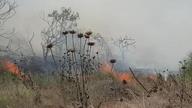
David Sharaf, 41, is accused of setting fire to Arab-Israelis' property, including a souvenir shop and an olive grove in Jerusalem; 'Burn Arabs because they burn us,' Sharaf said; No mention of a nationalist motive in the indictment.
The Central District Attorney's Office filed an indictment against David Sharaf, 41, of Eilat, for setting fire to Arab Israeli citizens' property. According to the indictment, Sharaf decided to set these fires to avenge recent events in the Gaza Strip. Nevertheless, the indictment does not mention a nationalist motive.
According to the indictment, filed by attorney Netanel Bujo, Sharaf planned to ignite the property of the Arab population. The accused also planned to set fire to open areas in order to prevent firefighters from responding to fires aimed at the Arab population.
The first fire was set on July 8th in a souvenir shop located in the Old City of Jerusalem. The following day the accused called his relative and told him that he intends to "burn Arabs" because, he claimed, "they are burning our property." The relative told authorities about the conversation, and Sharaf was questioned by police and removed from the city of Eilat for a period of 15 days.
The next day, the accused, according to the indictment, set fire in three additional locations — a field near the IDF base in the central Nahal Sorek, an olive grove next to a residential building in an East Jerusalem's neighborhood, and vegetation near several buildings and homes in Jerusalem.
According to the arrest petition, "The location of the fires increases the potential damage of his actions. The accused set fire near a military base, a field of thorns that ignites easily, and in the heart of a city, near many bystanders."
"The accused poses a larger threat because of his motives. He chose to attack areas adjacent to the Temple Mount and the Old City with the declared intention of stirring up the public and "setting the region aflame," the arrest petition maintained.
The State Prosecutor's Office asked the court to extend Sharaf's detention until the end of the proceedings. The State Attorney's Office noted that the nationalist clause is not mentioned in the indictment because such a motive carries a double sentence for offenses that carry less than a ten year sentence. If the offense carries a longer sentence, it does not matter if a nationalist motive exists or not.
In addition, there are certain offenses, such as the incitement offense, that can carry a double sentence if a nationalist motive exists. In a crime of murder, having a background in terrorism activity can add years to the sentence. But for crimes with a longer sentence, like arson, this doesn't mean anything.
Attorney Shiran Bergman, who represents Sharaf on behalf of the Public Defender's Office, said: "We have yet to receive the investigation materials. After we receive and study them we will respond in court. The court accepted our request and sent the accused to psychiatric observation."
The State Prosecutor's Office stated that "According to the Penal Law, a nationalist motive is mentioned in the section of the offense for the purpose of doubling the sentence, when the offenses carry up to 10 years in prison, while the arson charge attributed to the accused is 15 years. The accused intention to cause harm to Israeli citizens belonging to the Arab sector is explicitly mentioned in the indictment."
The Central District Attorney's Office filed an indictment against David Sharaf, 41, of Eilat, for setting fire to Arab Israeli citizens' property. According to the indictment, Sharaf decided to set these fires to avenge recent events in the Gaza Strip. Nevertheless, the indictment does not mention a nationalist motive.
According to the indictment, filed by attorney Netanel Bujo, Sharaf planned to ignite the property of the Arab population. The accused also planned to set fire to open areas in order to prevent firefighters from responding to fires aimed at the Arab population.
The first fire was set on July 8th in a souvenir shop located in the Old City of Jerusalem. The following day the accused called his relative and told him that he intends to "burn Arabs" because, he claimed, "they are burning our property." The relative told authorities about the conversation, and Sharaf was questioned by police and removed from the city of Eilat for a period of 15 days.
The next day, the accused, according to the indictment, set fire in three additional locations — a field near the IDF base in the central Nahal Sorek, an olive grove next to a residential building in an East Jerusalem's neighborhood, and vegetation near several buildings and homes in Jerusalem.
According to the arrest petition, "The location of the fires increases the potential damage of his actions. The accused set fire near a military base, a field of thorns that ignites easily, and in the heart of a city, near many bystanders."
"The accused poses a larger threat because of his motives. He chose to attack areas adjacent to the Temple Mount and the Old City with the declared intention of stirring up the public and "setting the region aflame," the arrest petition maintained.
The State Prosecutor's Office asked the court to extend Sharaf's detention until the end of the proceedings. The State Attorney's Office noted that the nationalist clause is not mentioned in the indictment because such a motive carries a double sentence for offenses that carry less than a ten year sentence. If the offense carries a longer sentence, it does not matter if a nationalist motive exists or not.
In addition, there are certain offenses, such as the incitement offense, that can carry a double sentence if a nationalist motive exists. In a crime of murder, having a background in terrorism activity can add years to the sentence. But for crimes with a longer sentence, like arson, this doesn't mean anything.
Attorney Shiran Bergman, who represents Sharaf on behalf of the Public Defender's Office, said: "We have yet to receive the investigation materials. After we receive and study them we will respond in court. The court accepted our request and sent the accused to psychiatric observation."
The State Prosecutor's Office stated that "According to the Penal Law, a nationalist motive is mentioned in the section of the offense for the purpose of doubling the sentence, when the offenses carry up to 10 years in prison, while the arson charge attributed to the accused is 15 years. The accused intention to cause harm to Israeli citizens belonging to the Arab sector is explicitly mentioned in the indictment."
|
|
Israeli settlers continued to storm the Palestinian village of Susiya, for the third day in a row, in the southern occupied West Bank district of Hebron, on Sunday.
According to local Ma’an sources, dozens of Israeli settlers, under the armed security by Israeli forces, stormed the Susiya village for the third day this week. The settlers reportedly performed Talmudic rituals in the area, and several of them were reported to have verbally assaulted the Palestinian residents of the village. While in the village, Israeli settlers were also calling for the displacement of Palestinian residents from their lands. |
Settlers regularly storm Palestinian areas in the occupied West Bank, to carry out such rituals under the protection of the Israeli army.
Visits by Israeli Jews to areas under Palestinian control across the West Bank often cause tensions with locals, as these visits are accompanied by large armed escorts.
Visits by Israeli Jews to areas under Palestinian control across the West Bank often cause tensions with locals, as these visits are accompanied by large armed escorts.
|
|
More than 1,000 Israeli settlers in consecutive groups, on Sunday morning, stormed the courtyards of Al-Aqsa Mosque under heavy protection by the Israeli forces, entering it from the Magharba Gate.
This follows a night of provocations on the Old City of Jerusalem, by Israeli settlers who raided its streets and carried out Talmudic rituals in front of the gates of Al-Aqsa mosque, especially the Bab al-Qatanin, on the eve of what they call “the destruction of the temple.” Local PNN sources in Jerusalem reported that large groups of settlers surrounded the courtyard of Al-Buraq Wall (the western wall of the Al-Aqsa Mosque) for hours, moving to the Al-Qataneen market on Al-Wad Street, and ending at Al-Aqsa Mosque, where they performed rituals from this side, under the strict security measures of the occupation forces. The sources pointed to several attempts by settlers, yesterday, to break into Al-Aqsa from various gates, due the closure of the Magharba gate on Friday and Saturday, while a group of settlers staged rituals in the Bab al-Rahma Islamic Cemetery. Islamic Jihad: Israel’s terrorism at Aqsa Mosque dangerous escalation Husseini: Settlers’ break-in at Aqsa Mosque will provoke tension Minister: Aqsa Mosque needs action rather than words Jordan strongly condemns Israel’s mass break-ins at Aqsa Mosque Hanini: Palestinians will not keep mum over Israel aggressions at Aqsa Palestinian Foreign Ministry condemns settler break-ins into Aqsa |
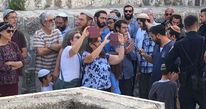
A state of growing tension has been taking place since the early morning of Sunday at the Aqsa Mosque compound after hordes of extremist Jewish settlers started to flock to the holy site and desecrate its courtyards.
Until this moment, over 530 settlers have entered the Mosque under police protection in response to calls by Jewish temple groups for marching en masse to the Islamic holy site today to commemorate what they call the destruction of the temple.
A reporter for the Palestinian Information Center (PIC) said that large groups of settlers swarmed the plaza of al-Buraq wall (the Aqsa Mosque’s western wall) at night and participated in several marches, especially in the Old City of Jerusalem near the Mosque.
Most of those settlers marched through al-Qataneen Market on al-Wad Street that leads to one of the Aqsa Mosque’s gates, where they kept performing night rituals.
Scores of settlers also tried last night to storm the Aqsa Mosque through different gates due to the closure of the Israeli-controlled al-Maghariba Gate on Fridays and Saturdays.
A group of settlers were also seen performing rituals in Bab al-Rahma cemetery, specifically in front of the closed golden gate of the Aqsa Mosque.
Palestinian activists, for their part, have urged the Jerusalemites and the Palestinians in the 1948 occupied lands to intensify their presence at the Aqsa Mosque to protect it against settlers’ break-ins on Sunday.. video video
Until this moment, over 530 settlers have entered the Mosque under police protection in response to calls by Jewish temple groups for marching en masse to the Islamic holy site today to commemorate what they call the destruction of the temple.
A reporter for the Palestinian Information Center (PIC) said that large groups of settlers swarmed the plaza of al-Buraq wall (the Aqsa Mosque’s western wall) at night and participated in several marches, especially in the Old City of Jerusalem near the Mosque.
Most of those settlers marched through al-Qataneen Market on al-Wad Street that leads to one of the Aqsa Mosque’s gates, where they kept performing night rituals.
Scores of settlers also tried last night to storm the Aqsa Mosque through different gates due to the closure of the Israeli-controlled al-Maghariba Gate on Fridays and Saturdays.
A group of settlers were also seen performing rituals in Bab al-Rahma cemetery, specifically in front of the closed golden gate of the Aqsa Mosque.
Palestinian activists, for their part, have urged the Jerusalemites and the Palestinians in the 1948 occupied lands to intensify their presence at the Aqsa Mosque to protect it against settlers’ break-ins on Sunday.. video video
21 july 2018
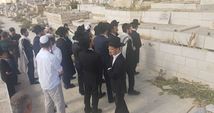
Dozens of Israeli settlers on Saturday stormed Bab al-Rahma cemetery adjacent to al-Aqsa Mosque and tried to perform Talmudic rituals in the place. video
Eyewitnesses told the PIC reporter that the settlers and the police forces accompanying them assaulted a group of Palestinian youths who were voluntarily cleaning the cemetery.
About a month ago, Jerusalem families launched a cleaning campaign in the cemetery in response to Israel's systematic targeting of the Islamic site.
Eyewitnesses told the PIC reporter that the settlers and the police forces accompanying them assaulted a group of Palestinian youths who were voluntarily cleaning the cemetery.
About a month ago, Jerusalem families launched a cleaning campaign in the cemetery in response to Israel's systematic targeting of the Islamic site.
20 july 2018

Extremist Israeli settlers, on Friday, assaulted a number of Palestinian amateur hikers while they were on a weekly trek near the village of Nabi Saleh, to the west of Ramallah, in the occupied West Bank.
Settlers from Halamish, an illegal Israeli settlement near the village, attacked and verbally abused the hikers, who were passing through a forest near the village. The settlers beat some of the hikers and chanted racists slogans against them, in the presence of Israeli soldiers.
Settler violence against Palestinians and their property is routine in the West Bank and is rarely prosecuted by Israeli authorities.
According to Israeli rights group B’Tselem, “As the occupying force, Israel must protect the Palestinians in the West Bank. However, the Israeli authorities neglect to fulfill this responsibility and do not do enough to prevent Israeli civilians from attacking Palestinians, their property and their lands.”
Settlers from Halamish, an illegal Israeli settlement near the village, attacked and verbally abused the hikers, who were passing through a forest near the village. The settlers beat some of the hikers and chanted racists slogans against them, in the presence of Israeli soldiers.
Settler violence against Palestinians and their property is routine in the West Bank and is rarely prosecuted by Israeli authorities.
According to Israeli rights group B’Tselem, “As the occupying force, Israel must protect the Palestinians in the West Bank. However, the Israeli authorities neglect to fulfill this responsibility and do not do enough to prevent Israeli civilians from attacking Palestinians, their property and their lands.”
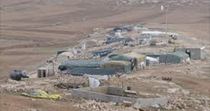
Dozens of Israeli settlers stormed on Friday morning Susiya area, south of Yatta, in the southern occupied West Bank province of al-Khalil, sparking terror among civilians.
A PIC news correspondent said cars carrying fanatic Israeli settlers rolled into Susiya in the morning. Dozens of settlers stepped in the area and performed provocative rituals near Palestinian homes.
The locals expressed concern that the break-in would herald an Israeli scheme to hold sway over Palestinian lands in the area in favor of illegal settlement expansion.
Speaking with PIC, Palestinian citizen Hasan al-Hreini said: “Israeli settlers step up such assaults on Fridays and Saturdays so as to terrorize our children and force us out of our homes.”
“This is the land where our fathers, mothers, and forebears have set up roots for thousands of years. We will never ever give it up. Our land is worth our souls”, he added.
A PIC news correspondent said cars carrying fanatic Israeli settlers rolled into Susiya in the morning. Dozens of settlers stepped in the area and performed provocative rituals near Palestinian homes.
The locals expressed concern that the break-in would herald an Israeli scheme to hold sway over Palestinian lands in the area in favor of illegal settlement expansion.
Speaking with PIC, Palestinian citizen Hasan al-Hreini said: “Israeli settlers step up such assaults on Fridays and Saturdays so as to terrorize our children and force us out of our homes.”
“This is the land where our fathers, mothers, and forebears have set up roots for thousands of years. We will never ever give it up. Our land is worth our souls”, he added.
19 july 2018

Two Palestinian families demolished their own four homes with a heavy heart on Thursday, in East Jerusalem.
According to Ma’an News Agency, locals said that the two families, Shawamreh and Abu Rmeileh, watched as bulldozers demolished their four homes in the Beit Hanina neighborhood.
The families, who were left homeless, pointed out that they have been living in their homes for about 17 years, and were proud for not giving up their homes to Israeli settlers.
The total space of the land, on which the houses are built, is 3 dunams (0.74 acres).
Following the demolition, both families insisted on setting up tents near the demolition area, where they will be staying and will find shade under the trees surrounding their homes, that they have grown for several years. They continued to say that “there is no other place for us to go.”
In 2006, an Israeli settler, Aryeh King, had claimed ownership of the land and orally informed both Palestinian families had built their homes; King had sent notices to the families to claim the land and demanding they pay rent.
Later in 2013, King appealed to an Israeli court and highlighted, in the papers and documents, that the land is owned by settlers; the court then approved the land ownership to the Israeli settlers.
The Israeli court ruled in favor of the settlers and granted them the land upon which the four Palestinian homes were built. The court sent a notice to the families to evacuate the area by August 1st.
However, both families refused to evacuate the area. They feared that their homes would be taken to only become another illegal Israeli settlement point.
As a form of protest against the Israeli settlers attempting to displace them and gain their property, the two Palestinian families took the matter in their own hands and demolished their own homes.
Under the pretext of building without a permit, Israeli authorities fined the Shawamreh family 120,000 shekels, while the Abu Rmeileh family was fined 75,000 shekels.
According to Ma’an News Agency, locals said that the two families, Shawamreh and Abu Rmeileh, watched as bulldozers demolished their four homes in the Beit Hanina neighborhood.
The families, who were left homeless, pointed out that they have been living in their homes for about 17 years, and were proud for not giving up their homes to Israeli settlers.
The total space of the land, on which the houses are built, is 3 dunams (0.74 acres).
Following the demolition, both families insisted on setting up tents near the demolition area, where they will be staying and will find shade under the trees surrounding their homes, that they have grown for several years. They continued to say that “there is no other place for us to go.”
In 2006, an Israeli settler, Aryeh King, had claimed ownership of the land and orally informed both Palestinian families had built their homes; King had sent notices to the families to claim the land and demanding they pay rent.
Later in 2013, King appealed to an Israeli court and highlighted, in the papers and documents, that the land is owned by settlers; the court then approved the land ownership to the Israeli settlers.
The Israeli court ruled in favor of the settlers and granted them the land upon which the four Palestinian homes were built. The court sent a notice to the families to evacuate the area by August 1st.
However, both families refused to evacuate the area. They feared that their homes would be taken to only become another illegal Israeli settlement point.
As a form of protest against the Israeli settlers attempting to displace them and gain their property, the two Palestinian families took the matter in their own hands and demolished their own homes.
Under the pretext of building without a permit, Israeli authorities fined the Shawamreh family 120,000 shekels, while the Abu Rmeileh family was fined 75,000 shekels.
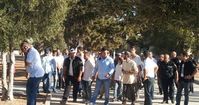
Dozens of Israeli settlers on Thursday morning broke into al-Aqsa Mosque under heavy police protection.
According to Quds Press, 118 settlers forced their way into the Mosque from Bab al-Magharbeh, which has been under full Israeli control since the occupation of Jerusalem in 1967.
The tours included some of the courtyards of al-Aqsa Mosque within a specific route ending with Bab al-Silsileh where the settlers performed Talmudic rites and prayers after exiting it.
Other incursions are expected to be conducted after the noon prayer.
According to Quds Press, 118 settlers forced their way into the Mosque from Bab al-Magharbeh, which has been under full Israeli control since the occupation of Jerusalem in 1967.
The tours included some of the courtyards of al-Aqsa Mosque within a specific route ending with Bab al-Silsileh where the settlers performed Talmudic rites and prayers after exiting it.
Other incursions are expected to be conducted after the noon prayer.
